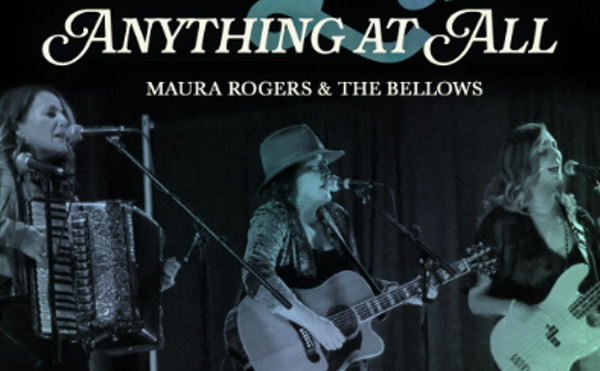Tommy Keene
In the Late Bright
(Second Motion)
If good reviews were the coin of the realm, Tommy Keene could hire Donald Trump to be his cabana boy. Yet, for some unfathomable reason, radio has stayed away from Keene's compelling, melancholy power-pop, while critics continue to anoint every new album as the one that will finally be his breakthrough and give him the rewards he so richly deserves. This passion play has been going on since Keene's 1984 EP Places That Are Gone nabbed the top spot in the Village Voice Pazz & Jop poll a quarter century ago. So the question looms: Will Keene's eighth studio album, In the Late Bright, be the one?
Like its predecessors, Late Bright bristles with the potential to kick Keene to the next level, packed as it is with some of the best material he's ever collected on a single album. His guitar playing has never been better, his lyrics have never been more incisive and his range of influences (the Who, the Beatles, the Byrds) has never been in sharper relief. The moody brilliance of "Late Bright," the jangling wonder of "Tomorrow's Gone Tonight" and the muscular pop brevity of "Goodbye Jane" are all reminders of Keene's mastery of reflective pop. If there's a surprise on Late Bright, it's Keene's first recorded instrumental, "Elevated," a psychedelic workout that bows to Pete Townshend and Ronnie Montrose with equal reverence. - Brian Baker
Dex Romweber Duo
Ruins of Berlin
(Bloodshot)
Featuring members of Flat Duo Jets and Let's Active, the Dex Romweber Duo plumbs the depths (and heights) of the darkly irreverent end of the Americana pool. Ruins of Berlin is a tart martini wryly wrought from rockabilly, instrumental/surf rock, pre-1970s country and pre-rock 'n' roll pop. Romweber croons as much as he rocks out, his smooth, often wistful baritone alternately evoking Roy Orbison, Robert Gordon and Tom Jones. The Duo gets some elite assistance from Cat Power (coolly cooing the oldie "Love Letters," featured in the movie Blue Velvet) and Neko Case (the Scott Walker-ish "Still Around"). Ruins includes plenty of deep, slightly dissonant twang and drums that crack like gunshots in the night, lent savor by spare, dry, almost spooky production. The only downside is that Romweber's vocals seem a little too mannered, extra-loaded with melodrama and irony. Only on the closing "Is It Too Late?" does he sound truly soulful. Still, Ruins is a good time for aging hipsters who have outgrown the Cramps. - Mark Keresman
Sholi
Sholi
(Quarterstick)
Sholi's full-length debut is the missing link between Fugazi and Radiohead. Chaotic post-punk rhythms slam up against the sort of serene fractures you'd find on OK Computer. Add some detailed instrumental passages that can float like a butterfly on acid or sting like an agitated bee, and you've got a musically complex album that never loses its sense of songwriting. While many bands come off directionless and scatterbrained when trying to use an array of cadences, Sholi's trademark is well-executed transitions. Jonathon Bafus' drumming is striking, serving as the guiding force for Sholi's musical leaps. Bafus has probably written more beats for this album than most drummers do in a lifetime. It's that diversity a band like Sholi needs if it plans to morph songs so often. And while Bafus is the glue holding the instrumentals together, it's frontman Pavam Bavafa's vocals that turn these genre-hopping jams into songs, using melody to guide listeners through Sholi's complex musical landscapes. - Matt Whelihan
Beirut/Realpeople
March of the Zapotec/Holland
(Pompeii)
Whether he's wandering through a foreign land or hanging out in his own bedroom, Zach Condon seems to have one thing on his mind: music. For the first half of this double EP, Condon traveled to Oaxaca, Mexico, where he teamed up with 19 local musicians to record songs for March of the Zapotec under his Beirut moniker. As always, the horns, cymbals and accordions Beirut weaves together lend a rich, distinctive Eastern-European sound. But this time, additional influences creep into Condon's songs, including those of the Mexican troubadours. The Santa Fe native layers his thick caramel voice over inventive instrumental patterns. On "The Akara," he plays a ukulele with drumsticks, creating a hollow, stringy effect. Condon goes by Realpeople (instead of Beirut) for the second EP in the set. He utilizes electronic synthesizers and programmed loops for these bedroom recordings. The contrast between the enormous band sound of March of the Zapotec and Holland's sparser tunes is a strange collision of past and future. Giving Condon a computer is like giving a musically inclined caveman an electric guitar - he's able to take elements of older musical styles and make them flourish with the new technology. - Danielle Sills
Passenger Action
Passenger Action
(Smallman)
In the late '90s and early '00s, Choke was one of Canada's finest exports. They took the speed and impassioned delivery of skate-punk and completely deconstructed it, offering up complex, disjointed riffing and the sort of shifting tempos that tech-heads drool over. Now, with Passenger Action, their first "post-Choke" band, singer-guitarist Shawn Moncrieff and bassist Clay Shea have brought their instrumental prowess to the world of post-hardcore. Passenger Action's self-titled debut does something Choke never could - sound comfortable. The criss-crossing guitars, layered rhythms and jagged approach to songwriting are all still present, but the anxious hyperspeed attack has slowed, leaving a little room to breathe. Tracks like "Absent Minds" and "To Credit the Archives" show a band that values atmosphere and restraint, while "Beneath the Rust" explores anthem territory without going overboard, and instrumentals "Night Frisbee" and "Good Ones Are Hard to Come By" show a band capable of lush compositions. Moncrieff's vocals may still be a little piercing, but otherwise this album features talented musicians improving their craft without pandering to generic songwriting conventions. - Whelihan
Lily Allen
It's Not Me, It's You
(Capitol)
Since she released her 2006 debut Alright, Still, singer-songwriter Lily Allen's offstage antics have attracted far more attention than her cheeky, fast-talking music. Although everyone adored the album (it went triple platinum worldwide), particularly the Ÿber-popular "Smile," there's been more gossip about her personal life than speculation about what her second album would sound like. That's unfortunate, because the songs on It's Not Me, It's You are clever and hooky, offering socially conscious and ironic lyrics that span from concern about the widespread use of drugs ("Everyone's at It") to strong disgust for bigotry and racism ("Fuck You"). The album is more layered than Alright, lending a delicate pop air to Allen's blunt, witty lyricism and lilting vocals. "The Fear" represents some of Allen's best work, as she takes the piss out of celebrities - and presumably her own paparazzi-ridden life - with lines like "I want loads of clothes/And fuckloads of diamonds/I hear people die while they're trying to find them/I'll take my clothes off/It won't be shameless/Because everyone knows that's how you get famous." It's rare that someone in the spotlight makes such a dead-on critique of her own position. It shouldn't be surprising that Allen does it best. - Emily Zemler
Alela Diane
To Be Still
(Rough Trade)
Alela Diane could easily be lumped in with all the other smooth, NPR-approved Americana artists who have pervaded independent music for the past decade. She's got strong, yet soothing vocals, and the sort of clear, simple arrangements that make her tunes sound like lullabies. Yet there seems to be something more behind her songs, something that doesn't automatically come with fiddles, banjos, studio drummers and clever producers. Call it an intimate understanding of craft or maybe even heart, but the songs on To Be Still resonate despite their familiarity. There may be more instrumentation (steel guitar, percussion, violin) here than on her debut, but Diane's serene, impassioned voice and traditional guitar work is still at the core. She's not shooting for Sufjan Stevens' grandiosity, merely subtle new complements. "To Be Still" benefits from a bit of snare shuffle and weepy fret-sliding, while thumping drums and an energetic violin help "White as Diamonds" shift from a lonely lament to a pub song. - Whelihan
D. Rider
Mother of Curses
(Tizona)
Considering that the group features guitarist Todd Rittmann of Chicago freaks U.S. Maple, it may not come as a surprise that D. Rider fits snuggly under the "avant-garde" heading. What is surprising is that he isn't afraid to embrace at least some of the songwriting standards U.S. Maple has shunned over the years. The resulting sound is fragmented yet accessible, like David Bowie getting together with art-gallery noisemakers. Opener "Arranged Marriage to No Toms" is an eerie mix of trippy guitars, blasts of static, ritualistic vocals and even the squeak of dry-erase markers. This mad-scientist rock continues on tracks like "Dew Claw, Don't Claw" with its free-jazz horn blurts, spliced drumbeats and broken-guitar ruptures, and "Dear Blocks," a sleazy take on a first date between Cap'n Jazz and Cake. Closer "Misery Whip" seems to be the only place the band ran out of ideas. A cliché, crunchy rock riff keeps a rather sluggish tune in the realm of mediocrity. It's a strange burst of testosterone-driven modern rock on an otherwise boundary-pushing album. - Whelihan













